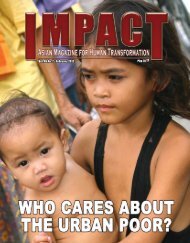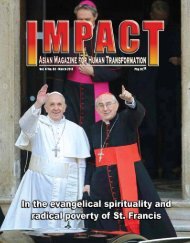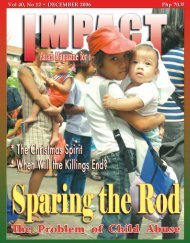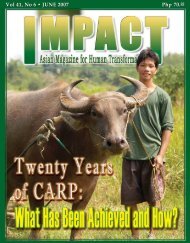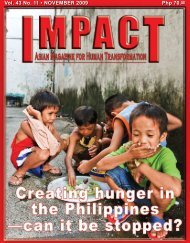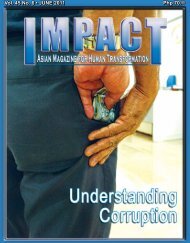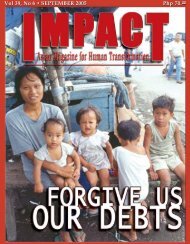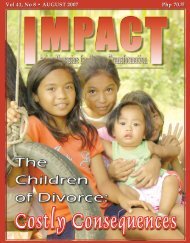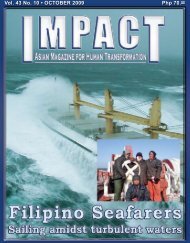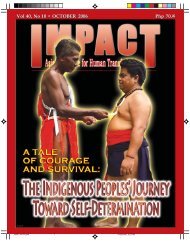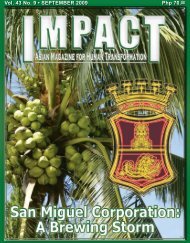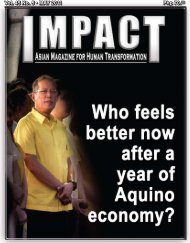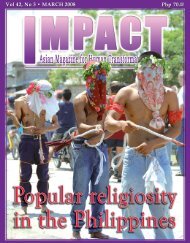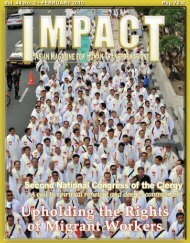Php 70.00 Vol. 44 No. 1 • JANUARY 2010 - IMPACT Magazine Online!
Php 70.00 Vol. 44 No. 1 • JANUARY 2010 - IMPACT Magazine Online!
Php 70.00 Vol. 44 No. 1 • JANUARY 2010 - IMPACT Magazine Online!
Create successful ePaper yourself
Turn your PDF publications into a flip-book with our unique Google optimized e-Paper software.
The Copenhagen Discord, or divide and rule in climate change<br />
into a climate “green room” of exclusive<br />
negotiations.<br />
And to the world press, the message<br />
continued to be that “the G77 is<br />
blocking negotiations.” At the same<br />
time, the message was reinforced that<br />
separate bilateral deals were being<br />
signed elsewhere.<br />
At the last minute, after a parody<br />
of the Danish presidency of putting up<br />
the negotiating groups once again at<br />
the insistence of the G77, three main<br />
issues were taken out of the negotiators’<br />
hands, the same three issues which resurfaced<br />
later in the Copenhagen Accord<br />
reflecting developed countries’ positions.<br />
These issues were the long-term<br />
“global goal”, the controversial market<br />
mechanisms and trade discussions, and<br />
most of all, financing.<br />
We were to have reconvened again to<br />
continue negotiations, but we never did.<br />
What took place behind closed<br />
doors was the backroom wheeling and<br />
dealing. I took part in the first meetings,<br />
where the big G77 countries were<br />
trying to revise the text presented by<br />
the Chairman. Small gains were made,<br />
but largely the revisions suggested by<br />
developing countries were ignored.<br />
The Accord mainly reflects developed<br />
countries’ positions on most issues.<br />
In particular, financing is to continue<br />
to be channelled through the failed<br />
delivery systems of the past, through<br />
“international institutions”, “public and<br />
private, bilateral and multilateral, including<br />
alternative sources of finance,”<br />
without acknowledging the legal obligations<br />
to provide financial resources<br />
under the governance of Parties.<br />
The final plenary broke out in<br />
confusion when the Danish Prime Minister,<br />
now Chairman, marched in after<br />
making the delegations wait for nearly<br />
five hours without any explanation,<br />
took the microphone to announce that<br />
a deal was done, called the Copenhagen<br />
Accord, as secretariat personnel frantically<br />
distributed the text, and instructed<br />
the rest of the meeting to break out in<br />
“regional groups” and to take one hour<br />
to decide on their future.<br />
He then closed the session precipitately<br />
without following normal<br />
procedures of soliciting views of Parties<br />
and proceeded to march out again<br />
when pandemonium broke out as Parties<br />
demanded to be heard. The only<br />
way to be given the floor was to ask<br />
for points of order, which were not<br />
heeded until nameplates were banged<br />
on the table. During the interventions,<br />
the Chairman looked on, glaring at the<br />
proceedings, turning now and then to<br />
consult the secretariat. <strong>No</strong> courtesy or<br />
proper attention was accorded to the<br />
speakers which included ministers and<br />
ambassadors heading delegations.<br />
The claim that only three or four<br />
countries spoke against the Accord<br />
and the procedures followed is false,<br />
as proven by subsequent interventions,<br />
punctuated by applause, from other developing<br />
countries or their supporters.<br />
Developed countries and their followers<br />
also applauded their own spokesmen<br />
and followers.<br />
Interventions of developed countries<br />
focused on a threat that the paragraphs<br />
concerning financing would not<br />
be “made operational” unless countries<br />
signed up to the Accord.<br />
Sad to say, pledges of financing<br />
have a way of evaporating over time,<br />
and financing done through existing<br />
institutions are unpredictable, difficult<br />
to access, conditional, and selective.<br />
Any governance system set up outside<br />
of the Convention itself is just another<br />
layer of bureaucracy, and equal representation<br />
of developed and developing<br />
countries outside of the UN system is<br />
unbalanced.<br />
What happens now?<br />
The Parties decided to continue with<br />
the ongoing process of negotiations,<br />
while taking note of the Accord which,<br />
on many of its provisions, undermines<br />
the developing countries’ positions in<br />
these negotiations. Parties took note<br />
of the Accord which would be open to<br />
participation by Parties, if they wish<br />
to avail of the promised financing, the<br />
terms of which are still to be determined<br />
by continued negotiations.<br />
What mainly happened is the complete<br />
breakdown of trust among Parties.<br />
To build it up again, under the shadow<br />
of an Accord that would be pursued at<br />
all costs, is immensely challenging.<br />
There are not only the legal obligations,<br />
but the moral and ethical considerations<br />
for developed countries to assume<br />
responsibilities to developing countries<br />
which did little to contribute to the<br />
problem of climate change, and which<br />
suffer most from its adverse effects.<br />
Economic interests should not prevail<br />
over the lives and survival of the poorest<br />
and most vulnerable populations.<br />
The holidays might provide time<br />
for reflection, and the firm resolve of<br />
the New Year in all these should be to<br />
work together to address climate change<br />
and its adverse effects, for the present<br />
and future generations, and the good<br />
of humankind. I<br />
(Bernarditas Muller, a retired Filipina<br />
diplomat based in Switzerland<br />
and an environmental adviser to the<br />
Department of Foreign Affairs, has<br />
represented the Philippines to international<br />
climate talks since before the 1992<br />
Earth Summit in Rio de Janeiro and was<br />
instrumental in negotiating the Kyoto<br />
Protocol in 1997. She is also currently<br />
the lead negotiator and spokesperson<br />
to the climate talks for 130 developing<br />
countries from Asia, Africa, Latin<br />
America, the Middle East and the Pacific<br />
island nations—a huge bloc known as<br />
the G77 and China.)<br />
Photo courtesy of IISD/Earth Negotiations Bulletin<br />
<strong>Vol</strong>ume <strong>44</strong> <strong>•</strong> Number 1 11



